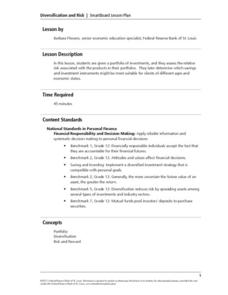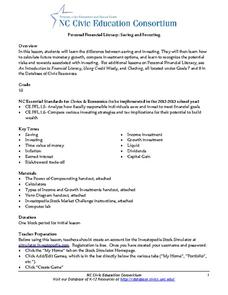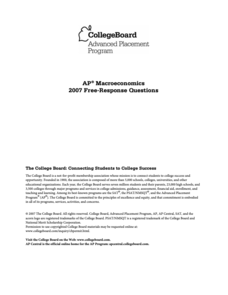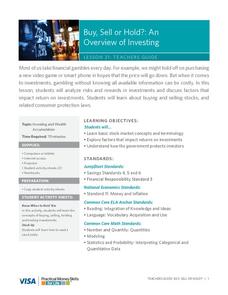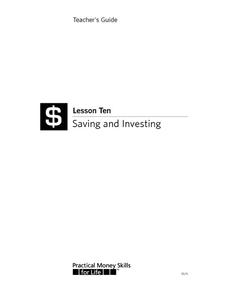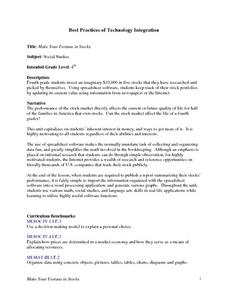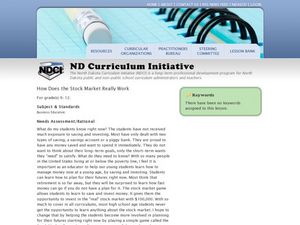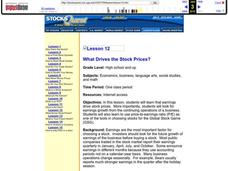PricewaterhouseCoopers
The Stock Market
Keep or sell? Young learners simulate as buyers in the stock market while learning about the benefits and important factors to know when purchasing. The thorough resource allows for observation of case studies and provides an assessment...
PricewaterhouseCoopers
Saving and Investing: Building Wealth for Financially-Secure Futures
While spending is fun, saving for a retirement is the future. Young adults learn about the importance of saving and different opportunities to do so during their adulthood.
Federal Reserve Bank
Diversification and Risk
After being given a portfolio of investments, your young economists will learn how to assess the relative risk of the portfolio's products and understand the importance of diversification, relating these economic concepts to real-life...
We are Teachers
What Goes Up Must Come Down
From understanding stock market performance and return on investment to identifying the costs and benefits of credit and avoiding debt problems, this is an absolute must-have resource for financial planning and literacy.
Curated OER
Stock Wars: Bringing Wall Street to your Classroom
Using interactive apps and structured assignments, you can make the stock market accessible to all students.
Curated OER
Making the Classroom Desk a Trading Desk
Create a stock market simulation to motivate pupils and make economic concepts meaningful.
Carolina K-12
Personal Financial Literacy: Saving and Investing
When should you save, and when should you invest? In considering this question, your class members will also learn about the time value of money, inflation, compounded interest, and income/growth investments. The resource also outlines...
Carolina K-12
Practice Test of Economics
From scarcity and supply and demand to entrepreneurship and the stock market, here you'll find a multiple-choice assessment that includes 34 questions covering all the major concepts of a traditional economics course.
Texas Education Agency (TEA)
Legal Responsibilities of Financial Exchanges
Let's stock up on knowledge! With lecture and discussion, pupils explore the legal responsibilities of monetary exchange. Scholars then research laws about financial exchange in the stock market and create a poster to illustrate their...
College Board
2007 AP® Macroeconomics Free-Response Questions
What happens when stock market prices fall and many investors sell off their holdings? Scholars explain the effects as they answer the question from the AP® exam. The resource provides other authentic College Board questions that include...
Balanced Assessment
Stock Market
Analyze trends in the stock market using histograms. Future economists use data presented in a histogram to find periods of greatest increase and decrease. They also draw conclusions about days that would be best to invest.
Worksheet Web
Analyzing the Text
Practice analyzing informational text with a reading passage that details the Great Depression. Scholars read about the impacts of World War I, the Roaring Twenties, and the Depression, then answer 10 true or false questions.
Core Knowledge Foundation
Isn’t It Exciting? (The American Industrial Revolution and Urbanization)
America was built on the ingenuity, work ethic, and foresight of our ancestors. Sixth graders learn about the complex Gilded Age in American history, including the prominent inventors and captains of industry, and how they all connect...
Federal Reserve Bank
Saving and Investing for the Long Term
Create savvy investors with an activity that uses an online resource to allow individuals to invest in the stock market. The teacher is able to track activity and progress. Stock tips and strategies are shared.
Visa
Buy, Sell or Hold?: An Overview of Investing
Break down the often-daunting topic of the stock market with this resource, in which pupils learn basic terminology regarding buying and selling stocks, as well as the factors that influence how much return individuals can receive on...
Visa
Saving and Investing
Impress upon your young adults the importance of saving and investing, and give them a foundational vocabulary from which they can continue to build their financial literacy. This lesson plan covers short- and long-term budget goals,...
Curated OER
Make Your Fortune in Stocks
Fourth graders participate in a stock investment activity in which they research stocks to place in an imaginary portfolio. They invest $10,000 in a variety of stocks and track their progress using the Internet or newspapers.
Curated OER
Why Study Economic Downturns?
Research and connect America's current economic downturn with the 1929 Stock Market Crash and the Great Depression.
Curated OER
The Stock Market and the Great Depression
How does the Stock Market work, what was Black Tuesday, and how did the Market crass of 1929 lead to the Great Depression? Have your class play this stock market game for two weeks to better explain how the stock market works.
Curated OER
How Does the Stock Market Really Work?
Investigate the stock market as it relates to the business world. Young scholars investigate ways to invest their money for the future. They make a presentation and discuss their findings with the class.
Curated OER
Stock Market Math
High schoolers calculate commission for a stock transaction through a broker using the relationship between percentages and decimals. They decide which stocks are preferable based on the price to earnings ratios listed on the stock...
Curated OER
What is the Dow?
Young scholars study about the most widely reported stock market indicator by the news media, the Dow or DJIA, short for Dow Jones Industrial Average. They complete a table that divides these 30 companies into different industry groups.
Curated OER
What Drives the Stock Prices?
Students see that earnings drive stock prices. More importantly, students look for earnings growth from the continuing operations of a business.
Curated OER
Grafting
Compatible plants can be grafted together. Some of the reasons for doing so are explored in this PowerPoint. Actual techniques for the process are not explored completely, but the slides give a lot of information and are nicely presented.




